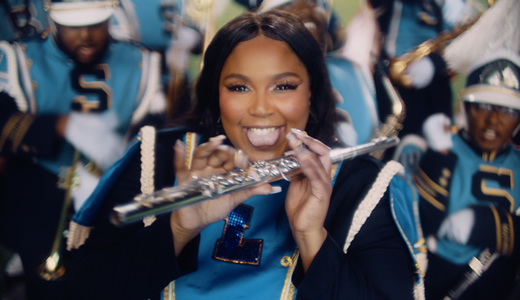Lizzo has been all over the entertainment media for several months. She won three Grammys last weekend and even nabbed a spot on Plugged In’s annual “Movers and Shakers” list.
But Time Magazine’s Entertainer of the Year also made headlines earlier this month when she announced her decision to quit Twitter. Blaming the decision on “too many trolls,” the singer/rapper/flutist said she would be back when she feels like it. And girl…SAME.
While many fans begged her to make use of Twitter’s “Block” feature instead, Lizzo didn’t budge. She also didn’t offer a response or state which incident pushed her over the edge. However, according to MTV News, the singer had recently found herself the target of body-shaming after Twitter user @drboycewatkins1 named her in a tweet about the “obesity epidemic in America,” claiming she was popular because she “lies” to people and tells them they’re “just fine the way they are.”
The “Truth Hurts” singer had previously spoken out about body positivity, telling The Daily Show’s Trevor Noah that “Before the term body positive was this kind of like mainstream thing, I was just making music about my body that was positive… Now body positivity is this like buzzing term. There’s no term for body negativity because it’s the norm. It’s what we expect…but I’m literally here making music so I can live a more positive, happier, healthier life.” She also shared with Time that even though she’s always created positive music, “the culture changed. There were a lot of things that weren’t popular but existed, like body positivity… Now I’ve seen it reach the mainstream.”
Before taking her Twitter hiatus, Lizzo did clap back at her troll, stating, “I’m popular because I write good songs and I’m talented and perform high energy hour and half shows filled with love. The only person who needs to do better is you.” The star then turned over her Twitter account over to her management team and avoiding the negativity.
This isn’t the first time a star has felt the need to “quit” social media after being trolled online. People Magazine reports that like Lizzo, Iggy Azalea quit Twitter in 2015 after being criticized for her physical appearance. When Star Wars: The Last Jedi came out, so-called “fans” of the franchise were so relentless in spreading their hatred of the character Rose Tico and the actress who plays her (Kelly Marie Tran) that Mark Hamill (who plays Luke Skywalker) had to come to Tran’s defense. He shared a picture of himself with the actress, writing, “What’s not to love?” and also started the hashtag: #GetALifeNerds.
Tran spoke out about the abuse, sharing that “For months, I went down a spiral of self-hate, into the darkest recesses of my mind, places where I tore myself apart, where I put their words above my own self-worth.” And although she has yet to return to social media, she has taken up the mantle of being a voice for minorities in her absence.
But some celebrities have a much harder time quitting social media . According to People Magazine, Kanye West quit Instagram and Twitter in October of 2018 after “he realized his [online] rants were becoming unhealthy,” but he returned a week later. Ariana Grande took a two-month “breather” to give herself a reprieve from the negative comments before returning to the fray. But the winner on this list for the shortest hiatus must be Cardi B. The rapper left Instagram in February of 2019 following criticism that she was undeserving of her Grammy win, but she returned just two days later to announce a collaboration with Bruno Mars.
Given the amount of abuse that celebrities have received via social media, it begs the question of why they are unable to stay away for an extended period of time.
Plugged In’s Bob Hoose wrote yesterday about the addiction of social media, stating that when people quit, they usually go through three stages tempting to draw them back. The first was pure peer pressure. People would wonder why they had quit and when they were going to return. The second was FOMO (Fear of Missing Out). Even if they had left their online platforms for valid reasons, they worried that they would miss something vital during the break and even found their hands “subconsciously groping for their phone and their fingers automatically flipping to where their favorite apps used to be.” But the third—and probably most likely reason for celebs to return—was sheer boredom. Indeed, this was the exact reason that model Chrissy Teigen gave when she returned to Twitter in 2014 after a seven-day fast: “I’m bored. I missed you guys.”
Hoose went on to say that “unplugging from a constant stream of negative comments, online trolls and toxic political commentary can do wonders,” noting that many people who quit social media, even for a brief period, reported a boost in their mental health.
Regardless of how we each feel about social media, the fact that even celebrities, with all their fame, money and power, feel the need to escape the online trolls from time to time, should give us all some insight into how we allow social media to affect us and what steps we can take to change that.







Recent Comments